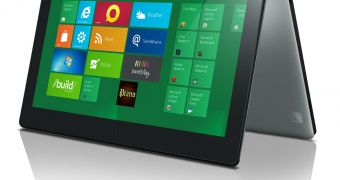It wasn't so long ago that we wrote about the IdeaPad Yoga tablet/ultrabook hybrid and, now, Lenovo has expressed its belief as to what this device type will accomplish.
IdeaPad Yoga is a sort of merger between a tablet and a super-thin and light mobile personal computer, hence its “hybrid” status.
We wrote all about it when it was introduced, during this year's edition of the Consumer Electronics Show (CES 2012).
Now, Peter Hortensius, senior vice president of Lenovo’s product group, expressed what he thought would happen because of the Yoga.
“The Yoga is a good example of where we see the industry going. It’s part of a vision that says that I don’t necessarily want to carry all these different things,” he told LaptopMag.
“I can use it as a tablet - it is a pretty reasonable tablet - and I can use it as a notebook, and it is a very good notebook. Ultrabook technology gives us the ability to create something that’s thin. A thin notebook combined with that very innovative hinge and the right software, and suddenly it comes alive.”
This is similar to how some people said tablets were the new face of the consumer IT industry.
Back when the iPad and, later, Android slates started showing up, some kept saying that laptops will become obsolete, while others kept believing that slates won't really amount to much.
The truth, now, is somewhere in the middle, as all truths tend to be: while netbooks declined sharply, notebooks are doing just fine, and Ultrabooks appear to be steadily gaining Steam.
As such, it is quite possible for hybrid devices like the Yoga to transform the market, though not to the point where it becomes unrecognizable.
“We think that a commercial user has commercial needs. The pen is critically important, because so much of the orientation there is markup and comment. With a finger-driven interface, it’s hard to do that,” the VP said.
“We also place a much stronger emphasis on security and the ability to manage devices, which is much more important for enterprise customers. [...] Consumers will resonate with a value proposition. But while price is important, to me it was very encouraging because the nature and the depth of integration in the product plays very strongly to our strategy. If you look at our four-screen strategy with a cloud and integrated capability underneath it aligns to that kind of view very well.”

 14 DAY TRIAL //
14 DAY TRIAL //